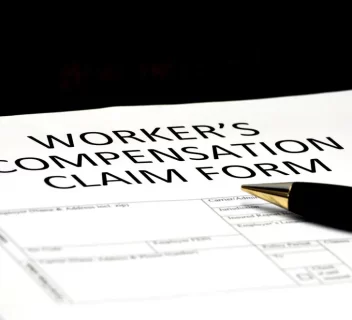Top Tips for Handling a Carpal Tunnel Lawsuit
Facing carpal tunnel syndrome and think your job is to blame? You might be eligible for a carpal tunnel lawsuit. This article explains how to identify work-related carpal tunnel syndrome, file a workers’ compensation claim, and understand the compensation that you could receive.
Key Takeaways
- Carpal tunnel syndrome (CTS) is often considered a work-related injury if it is triggered or aggravated by workplace activities, making documentation and proof of causation crucial for workers’ compensation claims.
- Filing a workers’ compensation claim involves timely notification to your employer, detailed record-keeping of work duties, and maintaining proper medical documentation to support your case.
- Legal representation is recommended for navigating the complexities of workers’ compensation claims for CTS, as an attorney can provide crucial support, negotiate benefits, and assist in appealing claim denials.
Understanding Carpal Tunnel Syndrome

Carpal tunnel syndrome (CTS) occurs when the median nerve is squeezed within a slim passage in the wrist, referred to as the carpal tunnel. This area contains both tendons and the median nerve, which extends from your forearm into your hand. When this nerve experiences pressure, it can result in numerous uncomfortable effects that may interfere with everyday tasks.
The common symptoms of carpal tunnel include:
- Arm pain
- Tingling sensations across different areas of the hand
- Numbness
- Hand weakness
Over time, these signs might worsen, leading to difficulties in handling activities that require detailed hand movements. A common method for diagnosing carpal tunnel syndrome includes carrying out a nerve conduction study to evaluate how much damage has occurred due to compression of the nerve.
Factors such as one’s wrist structure, engaging repeatedly in actions involving hands, or conditions like diabetes and arthritis could lead to CTS development. Early detection of risk elements and associated indicators is vital for obtaining necessary treatment promptly and averting Harm caused by this condition.
Is Carpal Tunnel a Work-Related Injury?

Carpal tunnel syndrome is frequently considered an injury associated with one’s occupation, particularly if workplace tasks have initiated or exacerbated the condition. Workers’ compensation in various regions, including California, recognizes CTS as a compensable repetitive stress injury when there is evidence that work-related activities were the cause or contributed to its severity. If your employment involves consistent movements like typing or using vibrating tools, you may qualify for workers’ compensation benefits due to these job-induced injuries.
To be eligible for workers’ compensation benefits for carpal tunnel syndrome, you must prove that it originated from your job and was not an existing ailment prior to employment. To establish this link between your CTS and occupational duties, accurately documenting both the nature of your work responsibilities—such as frequent typing or carrying heavy items—and the emergence of symptoms will bolster your case.
Confirming that carpal tunnel syndrome stems from workplace activities can pose difficulties and often necessitates professional legal support. Seeking advice from a seasoned workers’ compensation attorney could provide valuable guidance through the intricacies involved in filing a successful claim and ensuring adherence to all prerequisites needed to secure rightful benefits.
Filing a Carpal Tunnel Workers’ Compensation Claim
Submitting a workers’ compensation claim for carpal tunnel syndrome necessitates following specific important procedures. Initially, it is imperative to inform your employer in writing about your condition as soon as possible. Each state has its own deadline by which you must notify your employer and submit a workers comp claim—typically, those diagnosed with CTS have up to 30 days to ensure they do not forfeit their eligibility for benefits.
Accurate and thorough documentation plays a vital role in the success of a workers comp claim. You should meticulously record the nature of your job duties and how they may contribute to developing carpal tunnel syndrome. It’s often mandatory that you obtain medical care from physicians approved by the insurance company associated with your employer. Keeping detailed records of all medical treatments received and related expenses can greatly bolster your case.
Enlisting legal experts might prove helpful when compiling relevant medical evidence needed for supporting a workers’ compensation claim process. Filing through using accurate forms issued by the worker’s compensation board within one’s jurisdiction ensures adherence to established guidelines, ultimately enhancing prospects of procuring due workers’ compensation benefits owed from such claims—and familiarizing oneself with these processes could be advantageous overall.
Proving Your Carpal Tunnel Injury is Work-Related

Establishing that your injury is a direct result of your occupation is fundamental for a successful workers’ compensation claim involving carpal tunnel syndrome. It’s imperative to compile robust evidence, which includes medical records, testimony from experts, and comprehensive accounts of repetitive motion wrist activities in daily job functions known to lead to repetitive motion injuries. Engaging regularly with actions like typing extensively, utilizing computer mice frequently, or operating power tools and equipment that cause vibration are recognized as influential factors.
Corroborative statements from colleagues can Validate the presence of symptoms and affirm the connection between those symptoms and occupational tasks. Securing opinions from medical professionals who specialize in this field is critical. They must attest that the carpal tunnel condition specifically originates from work duties while also ruling out other potential causes not related to employment responsibilities.
Carefully documenting when symptoms first emerged alongside an exhaustive record detailing how certain work environments or specific job roles may have precipitated your carpal tunnel syndrome will serve to fortify your workers’ compensation claim substantially.
Legal Representation for Carpal Tunnel Lawsuits
Engaging the services of a workers comp lawyer can significantly improve your chances of securing equitable workers’ compensation benefits for carpal tunnel syndrome. Such legal representation assists in preventing errors that might undermine your claim and enlightens you on your rights and what you’re entitled to receive. An experienced lawyer in workers’ compensation can demystify complex legal terms and procedures, aiding injured employees in managing their claims effectively.
An attorney is also skilled at negotiating with insurance companies to ensure that those afflicted with carpal tunnel syndrome obtain the fullest extent of benefits they are eligible for. Before agreeing to any workers comp settlement, seeking counsel from a lawyer is prudent so as to comprehend if the offer adequately addresses all necessary compensatory needs—taking into account injury severity and missed work time due to recovery.
Although it’s not mandatory to employ a workers’ comp attorney when dealing with carpal tunnel cases, having one by your side tends to streamline proceedings while potentially offering considerable advantages. A consultation with an adept attorney may not only help optimize benefit outcomes but also facilitate a more seamless litigation experience. Contact 1-800-THE-LAW2 today for a free consultation with an attorney in our professional network.
Potential Compensation for Carpal Tunnel Syndrome

Compensation for carpal tunnel syndrome typically encompasses the costs of medical care, reimbursement for lost earnings, and provisions for future healthcare needs. Workers’ compensation should provide coverage for both medical bills and income loss stemming from CTS. Higher compensatory amounts might be granted in extreme instances necessitating surgical intervention.
When projecting necessities after sustaining an injury, it is crucial to take into account both the continuation of medical expenses and potential income losses. Those employed in positions that require significant hand usage may receive larger settlement sums due to extended periods needed for recuperation. Recovery durations can be prolonged by complications arising from pre-existing conditions, potentially diminishing the amount of settlement one could expect.
During the settlement process, negotiations will often hinge upon specific details related to your injury as well as forecasts concerning your future requirements. Seeking legal counsel when a settlement offer is on the table guarantees comprehensive consideration of all eligible forms of compensation ensuring you obtain just recompense for your affliction with CTS. Insurers are frequently inclined toward settling swiftly so as not to commit themselves to protracted financial responsibilities.
Common Professions at Risk for Carpal Tunnel Syndrome

Jobs that involve repetitive hand movements put workers at an increased risk of carpal tunnel syndrome. Specifically, individuals employed in manufacturing and industrial settings—such as assembly line workers and warehouse employees—are particularly vulnerable to CTS because their work requires repetitive actions. Similarly, those in the construction industry who handle vibrating equipment are also at a greater likelihood of contracting this condition.
People working with computers regularly, for example, data entry clerks and writers, often find themselves battling intensified carpal tunnel symptoms stemming from prolonged computer usage. In the beauty sector too, professionals such as hairstylists and cosmetologists might experience exacerbated symptoms due to continuous handling of styling tools.
The restaurant and food service industries aren’t exempt from these concerns. Chefs and servers routinely perform quick hand motions that may lead to carpal tunnel syndrome onset. Healthcare providers like surgeons and nurses frequently suffer from CTS because of the hands-on aspect inherent to their roles. For all these professions mentioned above, it is vital they remain mindful of preventative measures to reduce the chances of encountering CTS issues.
Navigating Insurance Company Challenges
Navigating the complexities of a workers’ compensation claim for carpal tunnel can prove to be quite daunting, especially when insurance companies challenge the cause of your condition. These insurers may suggest that non-work-related activities are responsible for your carpal tunnel syndrome, complicating the process even further. To overcome such hurdles and secure a favorable legal outcome, it is imperative to enlist professional legal help.
Should an insurance company dispute the work-related nature of your carpal tunnel syndrome, swift action is necessary. Promptly consulting with a lawyer who specializes in workers’ compensation will be critical. Denials from insurers often hinge on issues like procedural errors or disagreements among medical professionals involved in treating you. A knowledgeable attorney can assist in addressing these matters by ensuring robust backing with pertinent medical documentation.
Taking initiative and securing expert legal counsel arm you with strategic advantages against challenges posed by insurance carriers—bolstering your chances of winning your case. Being well-informed about both your rights as an injured worker and potential strategies employed by insurers prepares you effectively to safeguard your personal interests throughout this ordeal.
What to Do If Your Carpal Tunnel Claim is Denied
Should your claim for carpal tunnel be rejected, it’s crucial to act swiftly. Promptly securing legal aid can enhance the likelihood of reversing the decision by assembling additional proof for your case. Employing a lawyer who specializes in workers’ compensation can significantly improve your odds of prevailing in the appeals process.
To counteract a denial of your claim, you must submit a Declaration of Ready to Proceed so that you may secure a hearing with a judge on this matter. Alternatively, lodging an appeal at one of the regional Division of Workers’ Compensation offices is possible if you wish to dispute the rejection further. Typically, this procedure will involve participating in an obligatory settlement conference where negotiations with the insurance company take place.
In situations where there are disagreements regarding medical documentation related to your treatment, activating an independent medical review could be warranted. A knowledgeable attorney versed in workers’ compensation law can steer you through these procedures and assist you in fortifying your argument against the denial.
Summary
Dealing with a lawsuit related to carpal tunnel syndrome can be overwhelming, but being well-informed about your rights and the legal process is crucial for a favorable resolution. It’s important to acknowledge the signs of this condition and establish that it is linked to your occupation when submitting a workers’ compensation claim, as these elements are essential in attaining positive results.
Compensation options for individuals suffering from carpal tunnel include covering medical treatments, reimbursing lost wages due to time off work, and addressing future medical costs. These factors play an integral role in both your physical recovery and maintaining financial health. Enlisting the services of an attorney who specializes in workers’ compensation claims can help you avoid common pitfalls while striving for maximum benefits so that you receive just reparation.
Being vigilant and actively involved will serve as valuable tools when handling a lawsuit associated with carpal tunnel issues—ensuring that one’s interests are safeguarded effectively. Seeking adept legal counsel coupled with understanding all aspects of claiming procedures remains pivotal if one aims not only at securing merited advantages but also regaining composure post-litigation confidently.
Frequently Asked Questions
Is it hard to prove carpal tunnel is work-related?
Proving that carpal tunnel syndrome is work-related can be challenging, as personal testimony alone may not suffice. It is essential to have expert testimony that establishes a clear link between your symptoms and your work environment.
Can I get compensation for carpal tunnel?
Yes, you can pursue compensation for carpal tunnel syndrome by filing a workers’ compensation claim if it has developed due to your job duties.
It is important to document your condition and its relation to your work activities.
What is carpal tunnel syndrome?
Carpal tunnel syndrome occurs when the median nerve, which runs through the wrist’s carpal tunnel, becomes compressed. This leads to discomfort in the form of pain and tingling, along with a reduction in hand strength.
To mitigate these distressing symptoms and avoid additional health issues, it is imperative to pursue appropriate medical intervention for carpal tunnel syndrome.
What should I do if my carpal tunnel workers’ compensation claim is denied?
If your carpal tunnel workers’ compensation claim is denied, it is imperative to seek legal assistance immediately and file a Declaration of Ready to Proceed for a hearing before a judge to contest the decision.
Taking these steps can help you effectively challenge the denial.
Which professions are at higher risk for developing carpal tunnel syndrome?
Professions at higher risk for developing carpal tunnel syndrome include manufacturing and industrial workers, construction workers, computer-related professionals, beauty industry workers, restaurant and food service employees, and healthcare workers.
It is essential for individuals in these fields to adopt preventive measures to mitigate the risk.




